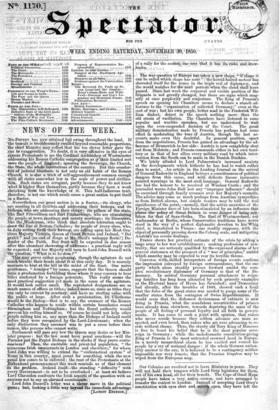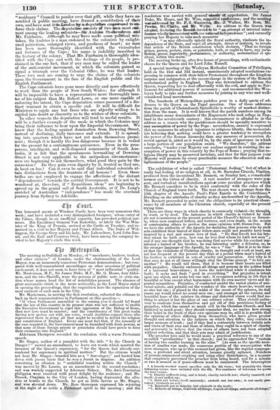Our Colonies are resolved not to leave Ministers in peace.
They will nett hold their tongues while Lord Grey legislates for them, Out of his own head, all for their benefit. The Cape of Good Hope people have taken a very active course, and have arranged to transfer the contest to London. Iustead of accepting Lord Grey's constitution with eyes shut and mou open, they have left the " residuary " Council to ponder over that gift, while they have as- sembled in public meeting, have framed a oonstitntion of their own, and have sent it* London thrisieputzirorn empowered *en- force their claims. The ellspntatien °insists of two mien most emi- nent among the leading nalonists—Sir Andzim Stodkenstrom stud Mr. Fairbairn. Although he may lave malle some political mis- takes, Sir Andries is a man endeared to the colonists by enlight- ened patriotism, enlarged views, and goodness of heart; no man has been more thoroughly identified with the vicissitudes and fortunes of the Cape ; his name is indelibly inscribed in the history of the colony. That Mr. Fairbairn is thoroughly iden- tified with the Cape and with the feelings of its people, is pro- claimed in the one fact, that if any man may be called the leader of the anti-convict movement, in which the colonists gained so signal a triumph over the Colonial Office, he was that leader. These two men are coming to urge the claims of the colonists upon the Governmenl. in the face of the English public and the English Parliament The Cape colonists have gone more directly and more effectively to work than the people of New &nth Wales ; for although it will be impossible to have a representative more thoroughly mas- ter of his subject than Mr. Robert Lowe, or one more capable of enforcing his intent, the Cape deputation comes possessed of a dis- tinct warrant to obtain a specific end. It will be difficult for Ministers to cajole any but those -who are abjectly willing to be cajoled into doubt or obscurity as to the wishes of these colonists. In other respects the deputation will tend to useful results. It will be a further example of the mode in which the Colonies may bring their influence to bear upon the Imperial Government. We know that the feeling against domination from Downing Street, instead of declining, daily increases and extends. It is spread- ing into quarters which have not yet made themselves promi- nent; though it is hardly the less dangerous because it is veiled for the present by a contemptuous quiescence. Even in the pros- perous, intelligent, and well-disposed community of South Aus- tralia, it is felt that the spontaneous lawmaking of Downing Street is not very applicable to the antipodean circumstances : men are beginning to ask themselves, what good they gain by the connexion? Do they gain even dignity by it, treated as they are, de haut en bas? Can it even be said that individual colonists at- tain distinctions from the fountain of all honour ? Even these trifles are not employed to engage the affections of the distant "dependencies" towards the central Government. It is not to be wondered at, therefore, if " Itepublioan ideas" are beginning to sprout up in the genial soil of South Australia, or if Dr. Tong's crotchet of Australian " independence " has made the overland journey from Sydney to Adelaide.



























